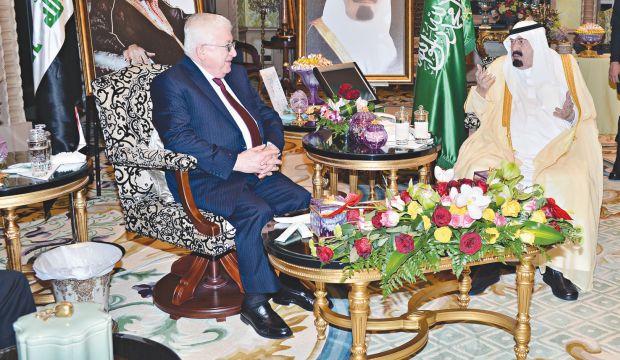
Saudi Arabia's King Abdullah Bin Abdulaziz (R) meets with Iraqi President Fuad Masoum (L) in Riyadh, Saudi Arabia, on November 11, 2014 (SPA)
Riyadh and Baghdad, Asharq Al-Awsat—Saudi Arabia is to press ahead with plans to reopen its embassy in Baghdad after an absence lasting over two decades, both countries have confirmed.
The Saudi Foreign Ministry said on Saturday that a team from the ministry would travel to Baghdad this week to coordinate with its Iraqi counterpart. It added that a Saudi general consulate will also be opening in Erbil, the capital of Iraq’s autonomous Kurdish region.
Speaking to Asharq Al-Awsat in December of last year, Osama Naqli, head of the media department at the Saudi Foreign Ministry, said the team from the ministry visiting Baghdad would be “technical in nature and not political,” and would carry out the preparatory work necessary for the reopening of the embassy, including deciding on a location.
He did not say when the embassy would be reopened, however.
This comes shortly after a series of official visits to Saudi Arabia by senior Iraqi officials, including Iraqi President Fuad Masoum and the speaker of the Iraqi parliament, Salim Al-Jabouri, both in November.
Saudi Arabia closed its embassy in Iraq and broke off relations in 1990 following the invasion of neighboring Kuwait during the presidency of Saddam Hussein.
The Kingdom appointed a non-resident ambassador to Baghdad in 2012, but relations between the two countries remained strained throughout the premiership of Nuri Al-Maliki, which lasted from 2006 to 2014.
There have been signs of improvement in bilateral relations since Prime Minister Haider Al-Abadi was appointed in September, with Iraq giving clear signs it is keen to patch up ties with its neighbors following the eight-year Maliki era, which saw a number of regional countries express disquiet at some of Maliki’s policies.
Speaking of the reopening of the embassy, Rafid Al-Jabouri, a spokesman for the office of Prime Minister Abadi, told Asharq Al-Awsat that Iraq had “turned over a new leaf in its relations with other countries, in particular neighbors in [our] region.”
“Iraq perceives that it should not only rebuild its relationship with Saudi Arabia, but also strengthen it, and I believe our Saudi brothers are with us here and that they share the same feelings, because we both have a common enemy: the Islamic State of Iraq and Syria [ISIS],” he said.
He described the previous period of tension between the two countries “as an exception and not the rule,” adding that “the peace and security of the region and the world” made the renewal of Saudi–Iraqi ties necessary.
Mithal Al-Alousi, a member of the Foreign Affairs Committee in the Iraqi parliament, told Asharq Al-Awsat the latest move was “the right start and moved [the relationship between the two countries] in the right direction, because any strengthening of Saudi–Iraqi relations would have a positive effect on peace and security in the region and the wider world.”
A member of the Kurdistan parliament, Muthna Amin, told Asharq Al-Awsat the Kurdistan Regional Government viewed the opening of a Saudi general consulate in Erbil as a positive step, and said that the move would help “open avenues in different areas,” including economic and investment opportunities from the Kingdom.
